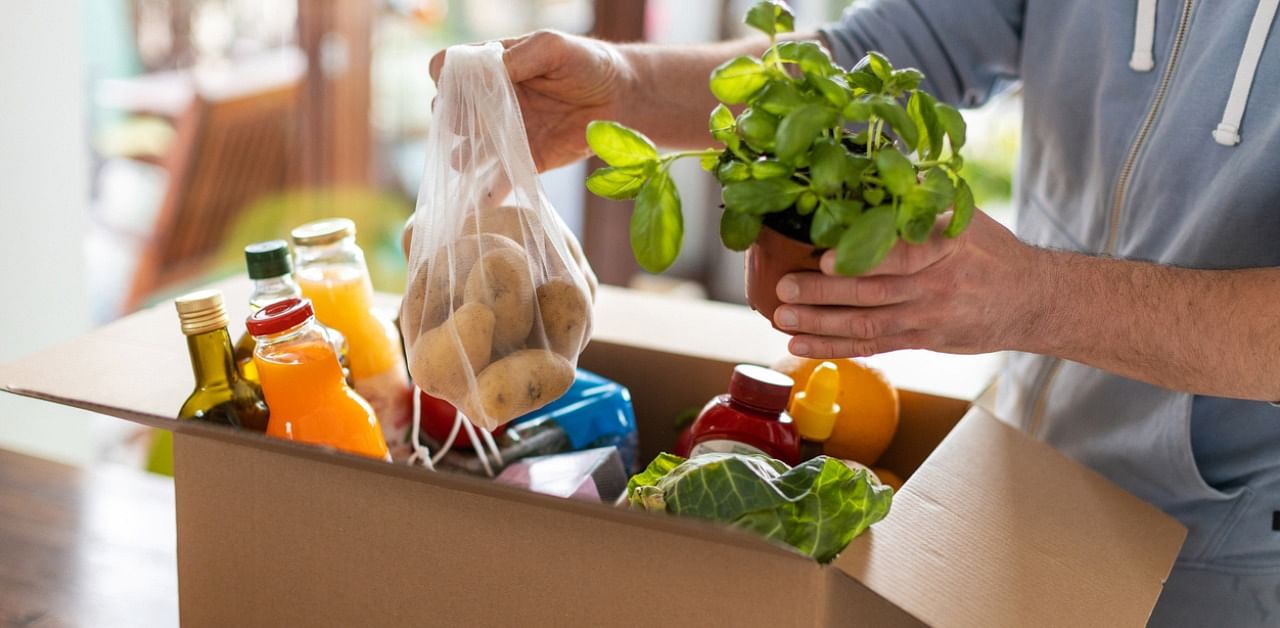
Waiting period for receiving essential items like grocery via e-commerce has gone up by as much as a week amid the second wave of the pandemic, as digital platforms struggle to balance larger order volumes and ensure safety of their workforce, according to industry executives.
As the country reels through the deadly second wave of the Covid-19 pandemic, various state governments have announced lockdowns to curb the spread of the infection. Most states have allowed delivery of only essentials like grocery and medicines via e-commerce.
A note on BigBasket's app said, "Due to Covid-19-related restrictions on movement in the city by local administration, your deliveries might get delayed... We are facing significant demand. We are distributing tokens to help you place an order."
The company declined to respond to a detailed questionnaire on the challenges being faced.
Amazon's Fresh service, which promises delivery in 2 hours, also shows availability only after a day in Delhi.
"In these unprecedented times, together with lakhs of sellers (including small and medium businesses) and associates across our network, we are working hard to serve customers while following stringent safety measures and government guidelines.
"We continue to work with the government to request them to allow home delivery of all products to safely fulfill customer needs," an Amazon India spokesperson said.
Interestingly, retail giant Big Bazaar is betting on online deliveries to make up for the lost business at its brick-and-mortar stores.
A Big Bazaar spokesperson noted that there are challenges on account of restrictions on timings and items that can be sold at physical stores, which also differ widely between various states and cities.
"While these do create a lot of challenges for retailers, Big Bazaar has rolled out two-hour online deliveries from stores and is using appropriate technology to ensure that we fully abide by the different restrictions in every city.
"Our Store2Door home delivery in two hours ensures customers do not face any issues and are safe within their homes," the spokesperson said.
A senior e-commerce industry executive, who did not wish to be named, said the waiting period for deliveries is as high as a week in cities like Chennai, while it is slightly shorter in cities like Delhi and Mumbai. The delay in deliveries is on account of multiple factors, including manpower availability and longer time taken for packaging to ensure hygiene.
The executive explained that there are instances where a lesser number of staff is available as members or their family members are unwell.
Also, extra precautions are being taken by e-commerce companies, while packaging to ensure hygiene and sanitation, which often pushes up delivery timelines.
While companies have ramped up hiring efforts to address the situation, the new recruits can only be onboarded after due health clearances (RT-PCR negative reports, etc).
Another industry executive said hiring is estimated to have gone up by three times than regular course of business.
When contacted, a Flipkart spokesperson said consumers' reliance on e-commerce to fulfil their needs has increased as they take necessary precautions and stay indoors.
"At Flipkart, our top priority is to meet the needs of consumers through a safe and robust supply chain as per the government guidelines.
"Grocery as a category that spans through staples, fruits and vegetables have seen increase in demand," the spokesperson said.
The spokesperson noted that over the course of the last year, Flipkart has significantly invested in building capacity to provide customers access to grocery essentials across over 50 cities including in Lucknow, Patna, Ahmedabad, Kolkata and Jaipur among others.
"Flipkart has leveraged its partnership on-ground and is working with its brand partners, sellers and MSMEs to ensure timely availability of essential products for consumers all over India," the spokesperson said.
Grofers, another e-commerce platform for grocery, said that as the number of Covid-19 cases rise in a particular region, there tend to be some constraints within the last mile fleet.
"While, so far, the deliveries for some items, within some areas, are happening as fast as two hours, most others are happening within 1-2 days.
"We have been ramping up our capacities — both in terms of the physical capacity of stocks and workforce to meet the growing demands," a Grofers spokesperson said.
The spokesperson noted that to minimise these disruptions, it has to compensate its last-mile delivery partners with higher wages (at times 2X) and incentives to ensure it is able to offer most customers the earliest deliveries of their essentials.
"Given the current situation, we are hiring additional warehouse and delivery staff capabilities to address the surge in demand and serve as many households as we can in this time of need.
"We have already hired 2,000-plus people across the cities of our presence," the spokesperson said.
Grofers plans to add over 7,000 more people across its supply chain and last mile operations to build additional capacity.